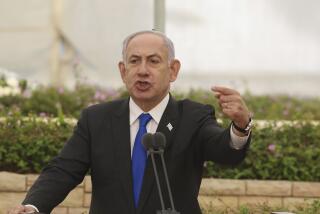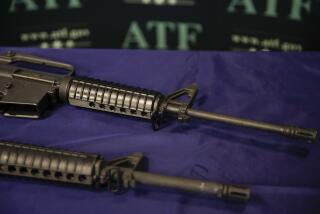U.S. Knew Arms Sales Broke Law, Pell Charges : Pakistan: The State Department was aware that commercial military transfers are barred by 1985 law tied to nuclear weapons, senator says.
In unusually strong language, the chairman of the Senate Foreign Relations Committee charged Friday that the State Department has knowingly violated federal law by permitting commercial sales of arms to Pakistan.
“Many in the State Department are aware that commercial sales to Pakistan do violate the law,” said Sen. Claiborne Pell (D-R.I.), a co-sponsor of the 1985 law that bars sales of military equipment to Pakistan while that nation is developing nuclear weapons.
Pell was responding to a story in The Times on Friday. The report disclosed that the Bush Administration had permitted Pakistan to buy spare parts for American-supplied F-16 fighter planes and other arms from U.S. firms vital to keeping its military operating.
Sources said the United States had issued munitions licenses for about $100 million in military equipment to Pakistan in 1990 and 1991.
According to Pell, the Foreign Relations Committee learned only recently of the commercial sales policy. The disclosure came after a department employee alerted the State Department inspector general’s office and the office opened an investigation, Pell said.
So far, Pell and other angry lawmakers have not indicated what they plan to do in response to disclosure of the sales. On Thursday, another powerful committee chairman, Sen. John Glenn (D-Ohio), said he, too, believes that the sales violate the law. A Foreign Relations Committee staff member said the panel will demand strict enforcement of the law.
Margaret Tutwiler, chief spokeswoman for Secretary of State James A. Baker III, told reporters Friday that the arms sales to Pakistan do not break the law because they are conducted by commercial firms. She repeated Baker’s contention that the law covers only direct sales by the U.S. government.
But Pell and other lawmakers challenged that interpretation of the law, called the Pressler amendment for its chief sponsor, Sen. Larry Pressler (R-S.D.). “To permit Pakistan to purchase spare parts for its existing American-supplied arsenal and to make commercial purchases in the U.S. defeats totally the non-proliferation goals of the Pressler amendment and would appear to be a blatant violation of the law,” Pell said.
In testimony before Pell’s committee last month, Baker acknowledged that commercial arms sales are being allowed. He asserted, however, that State Department lawyers had determined that they do not violate the amendment.
But Pell said other State Department officials believe the sales are illegal. “The committee, which was never informed of the commercial sales, learned of them from the State Department’s own inspector general’s office. . . ,” he said. “The State Department’s own investigators believed that commercial sales violate the plain meaning of the Pressler amendment.”
The law, passed in 1985, says that “no military equipment or technology shall be sold or transferred to Pakistan” unless the President certifies to Congress that “Pakistan does not possess a nuclear explosive device.” It was intended to slow nuclear proliferation.
In October, 1990, President Bush told Congress he was unable to certify that Pakistan was not developing a nuclear weapon and the arms ban went into effect. But the State Department continued to permit U.S. firms to sell arms and technology to Pakistan so it could maintain its existing arsenal.
Pell, who sponsored a predecessor to the Pressler amendment, said: “The broad language of both amendments was specifically designed to cover commercial sales. The policy reason for the Pressler amendment was to make Pakistan choose between a sophisticated conventional military capability and a nuclear capability.”
Waas is a special correspondent and Frantz is a Times staff writer.
More to Read
Sign up for Essential California
The most important California stories and recommendations in your inbox every morning.
You may occasionally receive promotional content from the Los Angeles Times.






